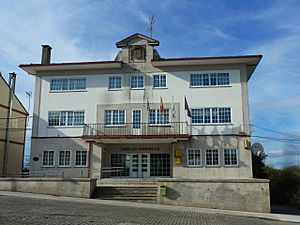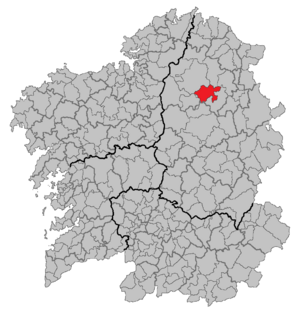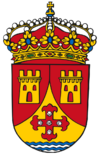Cospeito facts for kids
Quick facts for kids
Cospeito
|
|||
|---|---|---|---|
 |
|||
|
|||
 |
|||
| Country | |||
| Autonomous community | |||
| Province | Lugo | ||
| Comarca | Terra Chá | ||
| Area | |||
| • Total | 144.9 km2 (55.9 sq mi) | ||
| Elevation | 762 m (2,500 ft) | ||
| Population
(2018)
|
|||
| • Total | 4,596 | ||
| • Density | 31.718/km2 (82.15/sq mi) | ||
| Demonym(s) | Cospeitense | ||
| Time zone | UTC+1 (CET) | ||
| • Summer (DST) | UTC+2 (CEST) | ||
| Postal code |
27377
|
||
| Dialing code | 982 | ||
Cospeito is a small town, also known as a municipality, located in the Province of Lugo in Galicia, Spain. It sits on a flat area called Terra Chá. In 2007, about 5,349 people lived there. The mayor, or Alcalde, in 2007 was Armando Castosa Alvariño from the People's Party.
Contents
What Does the Name Cospeito Mean?
The exact meaning of the name Cospeito is still a bit of a mystery! Some experts, like Xosé L. G. Paz, think it might come from an old name called Conspecti. Another idea is that it comes from the Latin word "Conspectu(m)". This word means "visible from the surrounding area". It makes sense because the town is on a flat plain.
History and Nature of Cospeito
Cospeito is right in the middle of the Terra Chá plain. This area is known for its beautiful natural spots. You can find several small lakes here. The most famous one is the Lake of Cospeito.
The wetlands around the lake are home to many different birds. You might spot ducks, tall herons, and lapwings flying around. It's a great place for nature lovers!
Ancient Structures and Old Towers
Cospeito has a long history, with signs of people living there even before the Romans. You can still see parts of an old hill fort called O Torrillón in the village of Támoga. A long time ago, there was also a castle nearby. Sadly, this castle was destroyed during a big uprising called the Irmandiño revolt.
One of the most important historical buildings in Cospeito is the Tower of Caldaloba. It was built in the 15th century and is located in the village of Pino. Even though it's mostly ruins now, it's a cool reminder of the past.
Cospeito During World War II
During World War II, something interesting happened in Cospeito. The German army was allowed to set up three very tall radio antennas here. These antennas were huge, standing 112 meters high! Their job was to help German submarines (called U-Boats) and airplanes find their way. They were especially useful for tracking movements in the Bay of Biscay.
Famous People from Cospeito
Many talented people have come from Cospeito. Here are a few:
- Xesús Rábade Paredes - a writer and poet, born in 1949.
- Darío Xohán Cabana - another writer and poet, born in 1952.
- Fidel Fernán Bello - a journalist, born in 1954.
- Miguel Anxo Fernán-Vello - also a writer and poet, born in 1958.
- Emma Couceiro - a writer and poet, born in 1977.
- Luis Tosar - a famous actor, born in 1971.
Villages in Cospeito
The municipality of Cospeito is made up of many smaller villages. Each one has its own unique charm. Here is a list of them:
- Arcillá (San Paio)
- Bestar (Santa María)
- Bexán ou Rubiños (San Paio)
- Cospeito (Santa María)
- Goá (San Xurxo)
- Lamas (San Martiño)
- Momán (San Pedro)
- Muimenta (Santa Mariña)
- Pino (San Martiño)
- Rioaveso (Santalla)
- Roás (San Miguel)
- Santa Cristina (San Xiao)
- Seixas (San Pedro)
- Sisoi (Santalla)
- Sistallo (San Xoán)
- Támoga (San Xiao)
- Vilapene (Santa María)
- Vilar (Santa María)
- Xermar (Santa María)
- Xustás (Santiago)
See also
In Spanish: Cospeito para niños
 | Aurelia Browder |
 | Nannie Helen Burroughs |
 | Michelle Alexander |




